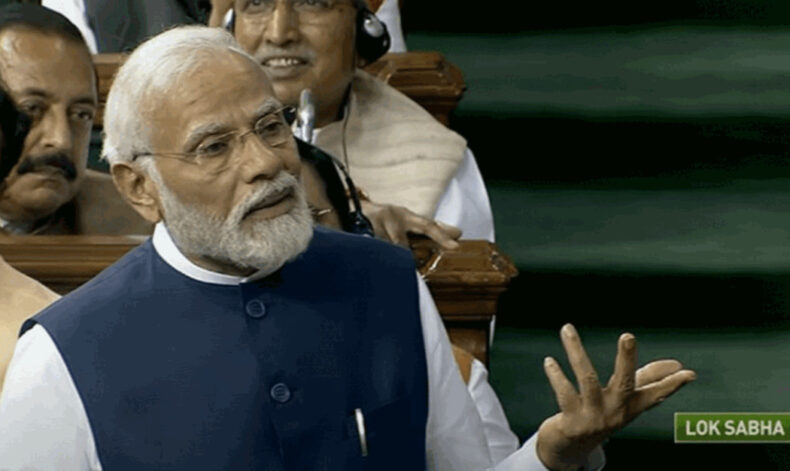Table of Contents
The deployment of armed forces to quell internal security crises has long been a contentious issue in India’s history. The recent parliamentary debate on a no-confidence vote saw Prime Minister Narendra Modi emotionally recalling two significant instances: the use of the Indian Air Force (IAF) in Mizoram in 1966 to suppress a rebellion and the Indian Army’s operation in the Golden Temple to eliminate terrorists. Prime Minister Modi’s reflection during this debate brought to the forefront critical questions about the use of heavy weaponry and air power in dealing with internal security crises. His statement underscores the need to reserve such potent forces for external adversaries, emphasizing the unique complexities and ethical dilemmas involved in deploying them against one’s own citizens.
The emotional resonance of the Prime Minister’s remarks during this recent parliamentary debate serves as a poignant reminder of the lasting scars left by these historical events. It prompts us to delve deeper into the broader implications of employing heavy weaponry and air power against internal threats.
This article not only examines the historical context of these operations but also sheds light on their enduring impact on India’s approach to internal security challenges. It underscores the delicate balance that must be maintained between safeguarding the nation and respecting the sensitivities of its diverse populace. The controversies surrounding Operation Jericho and Operation Blue Star emphasize the need for a measured and sensitive response to internal crises, one that upholds principles of justice, reconciliation, and human rights while ensuring the security of the nation.
Operation Jericho (1966): A Troubling Chapter in Mizoram
Background: The Mizo Rebellion- The 1960s witnessed a tumultuous period in Mizoram’s history, marked by protests and armed insurgency led by the Mizo National Front (MNF). Their objective was clear: independence from India. In response, the central government decided to deploy the Indian Air Force (IAF) to quell the insurgency.
The Controversial Use of Air Power
Operation Jericho, as history remembers it, involved the IAF using its air power against both rebels and civilians. On March 5, 1966, IAF fighter jets strafed and bombed villages in Mizoram, leaving an indelible mark on the region’s collective memory. The portrayal of these air attacks as “supply drops” only intensified the controversy surrounding the operation.
Long-lasting Effects
While civilian casualties may have been limited, Operation Jericho deeply scarred the psyche of Mizoram. Even today, March 5 is observed as Zoram Ni (Zoram Day) by the Mizo Zirlai Pawl, a student’s body. The operation serves as a stark reminder of the complexities involved in employing military force against one’s own people.
Operation Blue Star (1984): The Assault on the Golden Temple
Sikh Separatism and Bhindranwale
The 1980s witnessed a surge in Sikh militancy, with Jarnail Singh Bhindranwale at its forefront. He sought a separate Sikh state, Khalistan, and fortified himself within the Golden Temple complex.
Operation Blue Star: A Controversial Move
Operation Blue Star, authorized by Prime Minister Indira Gandhi in June 1984, involved a military assault on the holy shrine to remove Bhindranwale and his armed followers. The operation’s execution led to significant casualties and ignited outrage within the Sikh community, viewing it as an attack on their faith.
Impact and Consequences: A Nation Divided
Immediate Fallout – The operation resulted in immediate consequences, including protests and violence in Punjab and the assassination of Prime Minister Indira Gandhi by her Sikh bodyguards in October 1984. This tragic event led to severe anti-Sikh riots in Delhi and other parts of India.
Long-term Ramifications – Operation Blue Star left a lasting impact on Punjab and Sikh identity. The wounds of 1984 continue to shape the region’s socio-political landscape, with ongoing debates about justice, reconciliation, and the role of the state.
Prime Minister’s Reflection: Armed Forces and Air Power
During the recent parliamentary debate, Prime Minister Narendra Modi’s emotional reflection on these events has brought to the forefront critical questions about the use of heavy weaponry and air power in dealing with internal security crises. His statement highlights the necessity of reserving such formidable military forces for external adversaries, emphasizing the unique complexities and ethical dilemmas involved in deploying them against one’s own citizens.

Prime Minister Modi’s poignant remarks resonate with a broader concern—how to balance the imperative of national security with the sensitivity required when dealing with internal conflicts. The emotional intensity of his statement reflects the deep impact that these historical events continue to have on the collective consciousness of the nation.
The controversies surrounding Operation Jericho and Operation Blue Star underscore the delicate equilibrium between safeguarding internal security and honoring religious sanctity and regional aspirations. Prime Minister Modi’s poignant remarks have reignited a crucial national conversation about the judicious use of military force in domestic crises.
As India confronts contemporary security challenges, it must navigate these historical legacies to craft a response that is both effective and empathetic. These events serve as a sobering reminder of the enduring influence of history on the nation’s approach to internal security crises, reinforcing the need for a measured and sensitive response that respects the principles of justice, reconciliation, and human rights.












